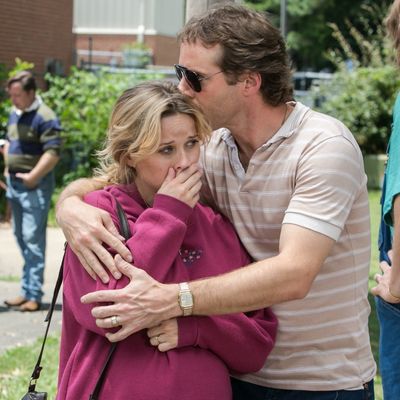
Devil’s Knot marks the intersection of two fascinating forces. On the one hand, we have the story of the West Memphis Three, the trio of teens wrongfully convicted of the grisly murder of three young children in a small Arkansas town in 1993. Their story has already been chronicled in four acclaimed documentaries — the three Paradise Lost films, as well as West of Memphis — so it takes a bold and brave filmmaker to give this harrowing, complex, and well-documented story its first fictional treatment. That brings us to the second force: Atom Egoyan, once one of the world’s most exciting directors, whose work at its best displays both dizzying intellectual complexity and enthralling emotional power. This film needs someone who can handle genre elements and dense narrative detail while never losing sight of the cascading tragedies at the heart of the tale — three lives lost, and countless others ruined. Egoyan seems like the perfect choice.
Which makes the disappointment of Devil’s Knot that much more striking. It’s not a bad film, exactly, but it’s a jumbled, uncertain one, and it never quite makes a compelling case for itself. It does start off well — which is to say, terrifyingly. We see Pam Hobbs (Reese Witherspoon) and her young son Stevie (Jet Jurgensmeyer) bantering playfully, as the little boy sings Elvis and tells his mom he’ll buy her a mansion one day. We see Stevie and his two friends bike off into the woods. And we see Pam and the other parents start to realize something awful has happened when the kids don’t come back after sundown. The whole town begins searching for the children. The cops drop everything they’re doing. Citizens knock on doors and scour the woods. And then, when a cop finally pulls a dead, naked boy out of a lake in the woods, it’s gasp-inducing — even for those of us who’ve seen the documentaries and know the horrific details of the crime. Egoyan knows that movies like to play coy with this sort of thing, for fear of upsetting us too much, and he’s ruthless about it: He keeps things sober, deliberate, and then suddenly rubs our faces in the horror.
He needs to. Because he’s about to show us what happens when a community becomes fueled by righteous and rightful outrage. He needs us to feel the pain of the crime so that we can understand what happened. But what happened is intricate, yet inexact. The facts of the case are such: Three teenagers — Damien Echols (James Hamrick), Jessie Misskelley (Kristopher Higgins), and Jason Baldwin (Seth Meriwether) — were arrested for killing the boys as part of a Satanic ritual. All three young men were misfits of a sort: Misskelley reportedly had an IQ of 72, while Echols had a history of mental illness and claimed to be a Wiccan. A host of witnesses, many of them since discredited, testified against them. The police botched several important other leads. The community became overwhelmed by a moral panic around Satanism and heavy metal. The result was a legal clusterfuck, resulting in three convictions, with Echols getting the death sentence, even though there were numerous questions about the evidence, as well as other unexplored narratives of what happened that day.
The West Memphis Three were released in 2011, but Devil’s Knot, based on Mara Leveritt’s 2002 book of the same name, doesn’t really get into that, confining itself to the events of 1993 to 1994. Egoyan focuses on the way the tragedy percolates out into the community, and on the efforts of a private investigator, Ron Lax (Colin Firth), who helped the defense lawyers pro-bono, fueled at first by his opposition to the death penalty and then by his conviction of the defendants’ innocence. Or rather, the film tries to focus on these elements. But there are so many facts twisting around, so many half-explored avenues and accusations and false testimonies that the movie loses us. The original trials of the West Memphis Three were a miscarriage of justice, but much of the evidence that exonerated them emerged later. And, more important, we still don’t know who murdered the three kids, so the film can’t present any alternate theories. There are no clean lines here: This part of the story requires a combination of both sober detail and dark poetry that Devil’s Knot never quite manages. Egoyan’s strangely antiseptic, procedural approach can’t contain the messiness of reality.
This isn’t the first time Egoyan has tackled the despairing subject of dead children. Indeed, his two masterpieces from the 1990s, Exotica and The Sweet Hereafter, both turn on this kind of loss. So it’s perhaps understandable that he may not want to dwell on the emotional and psychological consequences of the crime this time around; he doesn’t want to repeat himself. But still, that’s where his strength lies, and the film is at its best when detailing the pain, and growing doubt, of Witherspoon’s grieving mom. The film doesn’t exactly give her a lot to do; much of her performance is contained in quiet glances. But the rare moments when she lets the anguish show — as when, after the cops ask her for a hair sample, she begins tearing fistfuls of her hair and handing it to them, saying, “Take all of it” — give the movie a much-needed dose of humanity. Unfortunately, it still can’t offset the imbalance at the heart of this curiously dry and confusing legal thriller.


